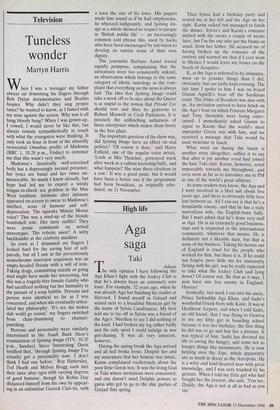Television
Tuneless wonder
Martyn Harris
When I was a teenager my father always sat drumming his fingers through Bob Dylan documentaries and Beatles biopics. Why didn't they sing proper tunes? he wanted to know, as I fumed with my nose against the screen. Why was it all bang bloody bang? When I was grown-up, I vowed, I would never be like this, but always remain sympathetically in touch with what the youngsters were thinking. It only took an hour in front of the absurdly reverential Omnibus profile of Madonna (BBC 1, 10.20 p.m., Friday) to convince me that this wasn't very much. Madonna's fanatically well-exercised body has a depressingly asexual presence; her lyrics are banal and her tunes un- memorable. So much I knew already, but hype had led me to expect a wittily tongue-in-cheek sex goddess in the Mae West tradition. Intimate after intimate appeared on screen to swear to Madonna's intellect, sense of humour and self- deprecation. The squeaky Minnie Mouse voice? This was a send-up of the blonde bombshell role. Her tarty outfits? They were ironic comments on sexual stereotypes. The robotic mien? A witty backhander at the celebrity machine.
So even as I drummed my fingers I looked hard for the saving hint of self- parody, but all I saw in the pretentiously monochrome interview sequences was an empty-headed floozie with a will of iron. Taking drugs, committing suicide or going mad might have made her interesting, but this was a tragedy-free female Gatsby who had sacrificed nothing but her humanity in the pursuit of a soap bubble. Persona and person were identical so far as I was concerned, and when she eventually articu- lated her philosophy: 'It's sex dat makes duh woild go round,' my fingers switched from chair-drumming to channel- punching. Persona and personality were similarly intertwined in the South Bank Show's examination of Spitting Image (ITV, 10.35 ' p.m., Sunday). Steve 'Interesting' Davis testified that, 'through Spitting Image I've actually got a personality now. I don't think I had one before.' Roy Hattersley, Ted Heath and Melvin Bragg each met their latex alter egos with varying degrees of good humour, though Sir Robin Day distanced himself from his own by appear- ing in an unfamiliar Garrick Club tie, with a knot the size of his knee. His puppet made him sound as if he had emphysema, he wheezed indignantly, and Spitting Im- age as a whole showed no respect to people in 'British public life' — an increasingly common cant phrase this, used by hacks who have been encouraged by television to develop an outsize sense of their own dignity.
The journalist Barbara Amiel waxed equally pompous, complaining that the caricatures were too consistently unkind, an observation which belongs to the same category of idiotic tautology as the com- plaint that everything on the news is always bad. The idea that Spitting Image could take a week off to be nice about the Queen is as stupid as the notion that Private Eye should now and then be generous to Robert Maxwell or Cecil Parkinson. It is precisely the unflinching unfairness of these enterprises which makes them funny in the first place.
The important question of the show was, did Spitting Image have an effect on real politics? 'Of course it does,' said Harry Enfield, one of the regular voice artists. 'Look at Mrs Thatcher, portrayed week after week as a callous hectoring bully, and what happens? She wins three elections in a row.' It was a good point, but it would have been a better one if the programme had been broadcast, as originally sche- duled, on 11 November.


























































 Previous page
Previous page